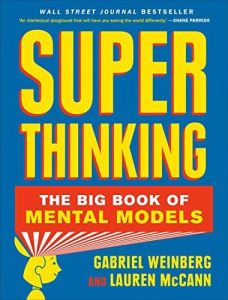Join getAbstract to access the summary!

Join getAbstract to access the summary!
Gabriel Weinberg and Lauren McCann
Super Thinking
The Big Book of Mental Models
Portfolio, 2019
What's inside?
Shortcuts help the world’s best thinkers distinguish great ideas from the not-so-great.
Recommendation
People use mental models – that is, concepts – to approach, analyze or anticipate decisions and problem solving. “Super models” imbue you with the power of super thinking to strengthen your decision-making skill. Husband-and-wife team Gabriel Weinberg and Lauren McCann list 300+ mental models from (and applicable to) a wide range of fields to guide you through challenging decisions. Their insightful, fast-paced reference manual offers practical examples you’ll read and return to again and again.
Summary
About the Authors
Gabriel Weinberg is the founder and CEO of DuckDuckGo and the co-author of Traction. Articles by statistician and researcher Lauren McCann, PhD, have appeared in The New England Journal of Medicine.


















Comment on this summary